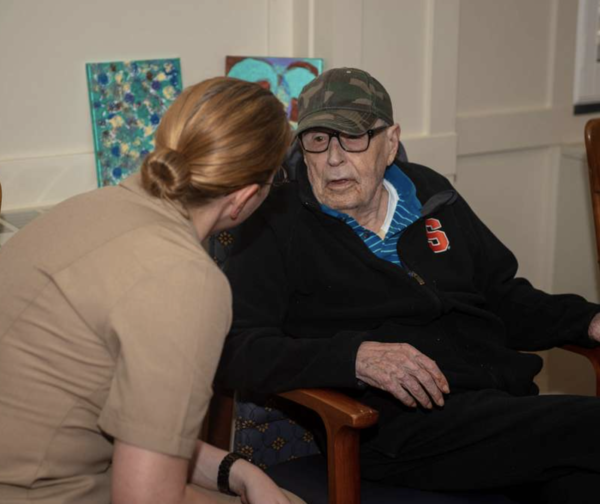
U.S. Army Veteran Robert Vanderveer with Chief Mass Communication Specialist Wendy Wyman during a community outreach event. (Photo: Mass Communication Specialist 2nd Class Horacio G. Idrogo Jr., U.S. Navy)
The United States is witnessing a significant increase in the number of elderly military Veterans. As the Veteran population ages, it becomes essential to address their needs and ensure they receive the care and support they deserve.
The demographics of the Veteran population are shifting, with new challenges and requirements arising. While older Veterans generally have higher incomes, they tend to experience more health issues, emphasizing the need for targeted outreach to connect Veterans with the benefits and services available to them. This changing landscape calls for a comprehensive approach to care and support.
California, home to the highest number of Veterans, is actively working to address the needs of its aging Veteran population. According to the U.S. Census Bureau, almost half of Veterans in California are aged 65 and above, and nearly one-third of all Veterans in California rely on the U.S. Department of Veterans Affairs for their healthcare needs. This highlights the significance of California’s efforts to provide thorough assistance and resources to address the requirements of its aging Veteran community.
The California Department of Veterans Affairs recognizes the importance of creating modern facilities that prioritize the needs of older Veterans. Similar efforts are being made across the country by the Department of Veterans Affairs and various Veterans organizations to provide extensive care and support to a new generation of older Veterans.
Vietnam and Gulf War-era Veterans bring with them different needs and expectations compared to Veterans of World War II and the Korean War. This includes a significant increase in the number of Women Veterans over the age of 65, as well as greater racial diversity and shifting geographic distribution. Providing care for a diverse population requires adapting to their circumstances and ensuring that appropriate support is available.
Specialized care is needed to manage chronic conditions, address disabilities, and provide mental health support. Expanding healthcare resources, enhancing geriatric care programs, and increasing funding for Veterans’ healthcare are essential steps in meeting evolving demands.
Supporting aging Veterans also involves creating social networks and opportunities for engagement. Combatting social isolation and providing a sense of community are important for well-being. Activities, social programs, and peer support can help foster connections and combat loneliness among Elder Veterans.
Providing adequate benefits and financial assistance is essential for Veterans who may face financial challenges in their older years. Strengthening existing benefits programs and offering targeted financial support can alleviate financial burdens and enhance their overall quality of life.
Caregiver support is another vital aspect of caring for aging Veterans. Many rely on family members or caregivers for day-to-day assistance. Providing support, respite care, training programs, and financial assistance to caregivers ensures that Veterans receive the consistent care they need while supporting those who dedicate themselves to caring for them.
Accessible housing and facilities are also essential to meet the needs of Elder Veterans. Modifying housing programs to accommodate specific requirements, including accessibility features and supportive services, is significant. Additionally, providing affordable housing options near medical facilities and support networks can greatly enhance their quality of life.














We 65+ Vets already know all these “needs” you wrote about I was hoping to actually read something–anything–that”s naming someone/some place to contact to actually get such help, but NO. I can’t even get the San Diego VA to give me a ride to the hospital (I have no other way to get there) to meet with the Neurological Dept. re my recent stroke because I only have a 10% rating, which apparently, appears to have nothing to do with the stroke.